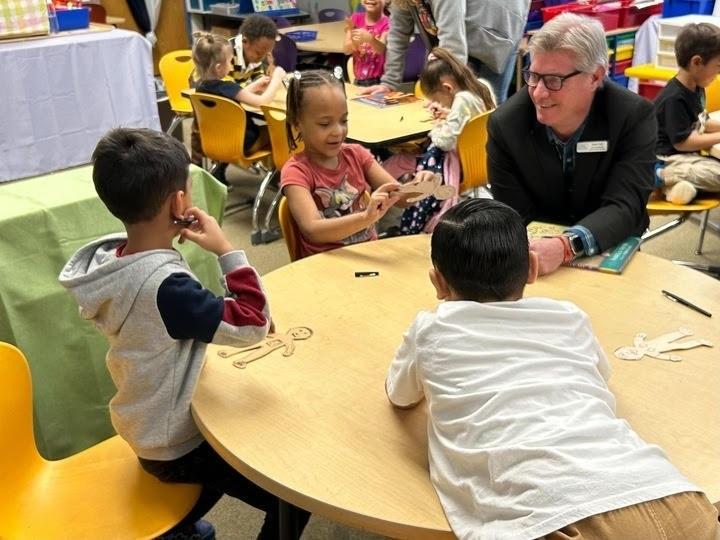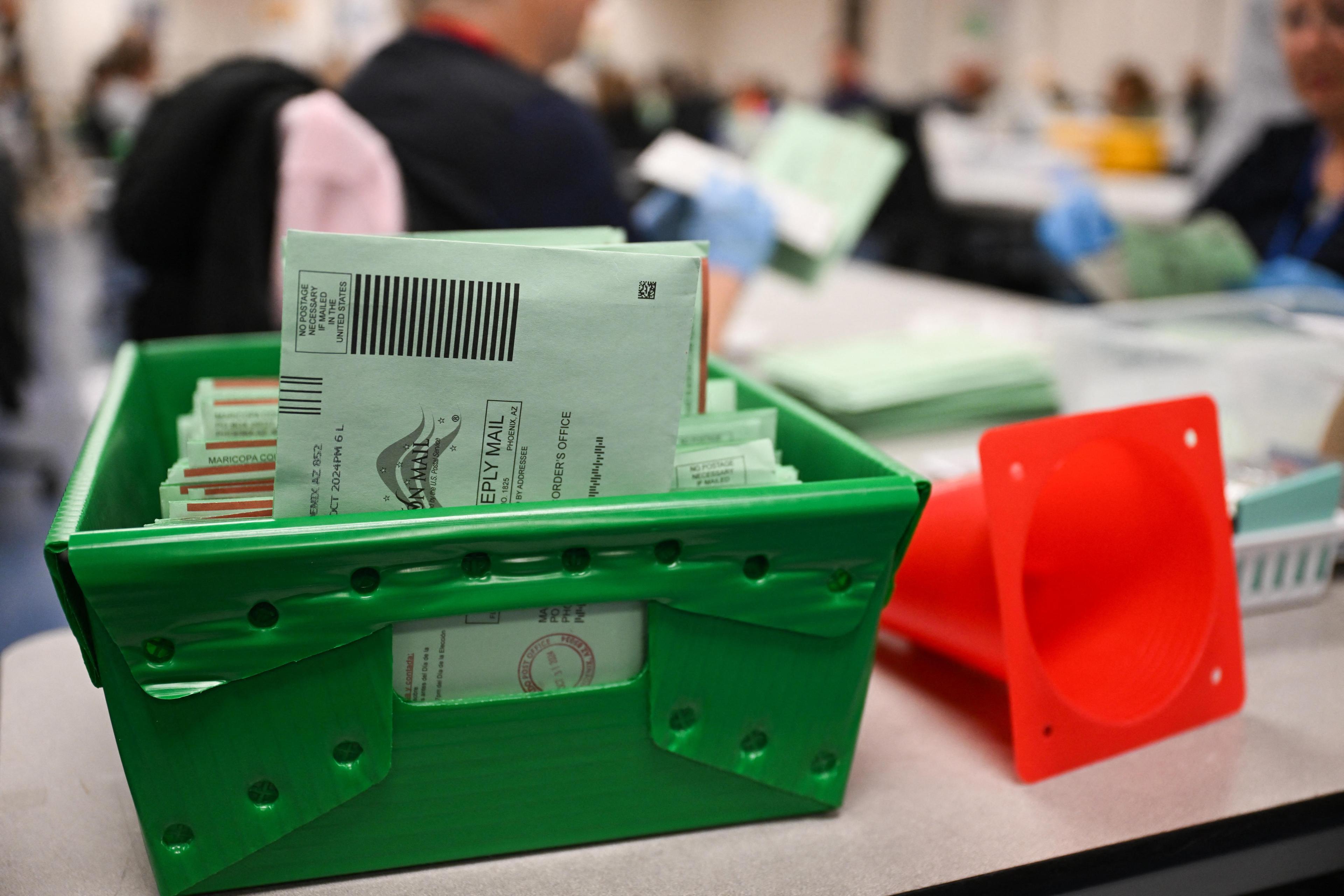
With the school year starting, we thought we’d check in with the new president of Colorado’s largest teachers union. Kevin Vick will lead the Colorado Education Association, which has nearly 40,000 members. He’s been vice president for six years and before that was a high school social studies teacher.
He spoke with CPR News education reporter Jenny Brunding about what’s great about the teaching profession, its challenges, social media, and how to make schools more creative.
Read the interview
Editor’s note: This interview transcript has been edited for length and clarity.
Jenny Brundin: Kevin tell me most about what you liked about being a teacher.
Kevin Vick: When you have that kind of challenging kid that really gets to you every now and then but you finally make that breakthrough, that is always one of the most incredible and rewarding experiences. That can happen on a full class level as well -- you have this difficult class that is giving you some trouble and then all of a sudden at some point in the year, they just have this big breakthrough and turn into this amazing experience.
I think also some of the more rewarding stuff is somebody will come up to you in a grocery store that you kind of vaguely recognize and say, ‘Mr. Vick, you were my favorite teacher. You changed my life. I got interested in this thing because of your class.’ And those are all pretty much the things that keep us in the profession.
Brundin: I'd like to get a sense from you on how teachers are doing. As we head into the new school year, what are you hearing?
Vick: One of the great things about our profession as well is every year is an opportunity for renewal. And so as we head back to school, there's always this optimism that things are going to be really great this year. But I also think teachers are pretty battle-scarred from the last few years in terms of having to continually fill gaps and cover things from the lack of staffing that are in certain areas in our system right now.
Brundin: Do we have a sense of how the teacher shortage this year compares to last year?
Vick: So first of all, we characterize it as not necessarily a shortage. There are more than enough people in Colorado that have educator licenses that could be in our system. Right now, we kind of treat it more as an exodus. People have been in the system, have found it to be challenging or have found other opportunities elsewhere and have left. But given that it's highly variable, it depends on where you are in the state and what specific positions you may be looking for.
If you’re a small school district in a remote area, the lack of a psychologist is going to be profound because you probably don’t have one but if you’re a large district, if you’re supposed to have 10 psychologists and you only have three, that is a logistical challenge as well.
Brundin: For a perspective, last school year there were about 1,400 educator positions that went unfilled. I know another stress point is working conditions. There are a huge number of new initiatives and programs that educators must incorporate into their workflow. When we're talking about improved working conditions, do you think some of those could be streamlined? Is that part of what is weighing heavily on teachers and their time?
Vick: Absolutely. I mean, I think there are a number of provisions that have been put in the system over the last few years that create a conflict of priorities. There are certain restrictions around not only just standards, for instance in math but now there are even restrictions around particular curriculum types or specific programs that you have to follow when you are teaching math. And that kind of restriction creates a lot of conflicting priorities because you get a message that everybody has to be at the same level on the same day, at the exact same time, and you teach things exactly the same way, and kids just don't work that way. And so when you’re trying to differentiate (teach to different academic levels) at the same time you’re trying to stick to the mandate of being in a certain place at a certain point no matter what, and that creates a lot of stress and anxiety in an educator.
Brundin: We’ve seen very little research on the impacts of out-of-school screen time on academics as opposed to mental health. The Centers for Disease Control reports that 8- to 10-year-olds spend six hours a day on screens, 11- to 14-year-olds, nine hours, and 15- to 18-year-olds, seven-and-a-half hours. This is screen time outside of school. Are teachers talking about this and do they see it having an impact on, say, reading and writing scores?
Vick: I would agree, I don’t know if there’s a whole lot of specific research on the specifics on academics. What we are finding is screen time is an overall component factor in trying to have effective classroom management, engagement and other things that are really important in schools. And I mean, let's be honest, these devices are built for entertainment. So to be able to try and compete with that level of specific sophistication and entertainment value, that is a new dimension in teaching that is also something educators are having to manage as well.


Brundin: Since last year, eight states have limited or banned phones in classrooms (and) a few Colorado districts have. Would you like to see a bill proposing a statewide ban and why or why not?
Vick: We need to explore a little further about what a lot of the implications in the actual classroom might be. One of the things that always gets challenging for educators is something gets banned or is mandatory and then the implementation of that falls solely on the educator themselves and there's no mechanism in the system to back them up on any sort of enforcement.
There are actually a lot of applications that educators have become used to using (with) cell phones for different things in their classroom, and so we may be inadvertently disrupting some really good educational opportunities in the classroom if we're not careful about it.
Brundin: A local nonprofit just came out with a roadmap to help teachers incorporate artificial intelligence into schools. What have you been hearing from teachers about this and has your organization taken a policy position on this?
Vick: Our national organization just did a whole policy statement on artificial intelligence and education, and largely the policy is that education is the most human thing that we do. And so as much as possible we could use artificial intelligence as a tool and not a replacement because we will lose the most vital components of education if we take away the human element.
Brundin: I'd like to turn to chronic absenteeism. CPR just produced an in-depth story on chronic absenteeism showing Colorado with the fifth-highest rate in the country, at 31 percent of kids, who miss a lot of school. This is from the 2022-23 school year compared to say Alabama's rate of 17 percent. I'm curious if you have any thoughts on why Colorado's rate is so high.
Vick: I imagine like most things in education, the answer is incredibly complex and has a lot of factors involved in it. One thing that I think may get underreported or underappreciated is the idea that the intense standardization and the intense standardized testing regime that we have can produce an environment that simply is not fun, not enjoyable, and also labels kids detrimentally.
If you’re a 6- or a 7-year-old and you have been labeled as not proficient as ineffective, then you quickly internalize that school is not for you and why would you want to be there. I think we have to rethink how we are dealing with early education in particular to give kids an understanding that school is a place they want to be. If we’re not careful in those early years, they have these internal messages that they carry with them throughout their careers.
Brundin: There’s an accountability task force going on right now examining the way the state holds schools accountable. There's been criticism, as you just mentioned, that Colorado's method gives significant weight to standardized test scores. Are there other states that are seeing success with a different approach that maybe would allow for less standardization, more creativity?
Vick: There are several states out there that are using more of a dashboard type of approach and bringing in more observational factors involved in deciding whether or not a school is meeting state standards. I think we are one of the last states that relies as heavily as we do strictly on test scores.
Brundin: Colorado elementary and middle school ratings are based entirely on test scores and academic growth. In high school, the rating also brings in graduation and dropout rates and college matriculation rates. This year state lawmakers allocated more money for schools each year. For the past 14 years, they sent less money to schools so they could balance the budget. Altogether schools were shorted $10 billion over that time, Lawmakers have committed to not doing that anymore. Is that enough money for schools?
Vick: Even though the state has quit borrowing from education to meet its budget number, we are currently adjusted for inflation at 1989 funding levels. You think about all the things that have come into a school system and all the expectations that are now in a school district and what they're expected to provide, and you see that the funding is really inadequate. We are at the bottom in terms of competitiveness…
Brundin: With teacher pay …
Vick: With teacher pay, correct. And so clearly those factors have an effect on how we are able to keep good, qualified, knowledgeable staff in the system to be good for kids.
Brundin: Kevin, I've asked about a lot of issues that are oftentimes the main issues. Is there anything else you wanted to add or flag?
Vick: We have to start really thinking about a school as a workplace. It's not only a workplace for adults, but we have to start thinking about it as a workplace for kids. What kind of workplace really do we want our kids to be in? Do we want a creative, opportunistic sort of workplace where they can really explore and find strengths and be in a place where you can try out a whole bunch of different things and learn how to work through problems and become resilient -- or do we want to stick to kind of a one size fits all model that doesn't really allow for a whole lot of creativity or let a kid play to their strengths?



